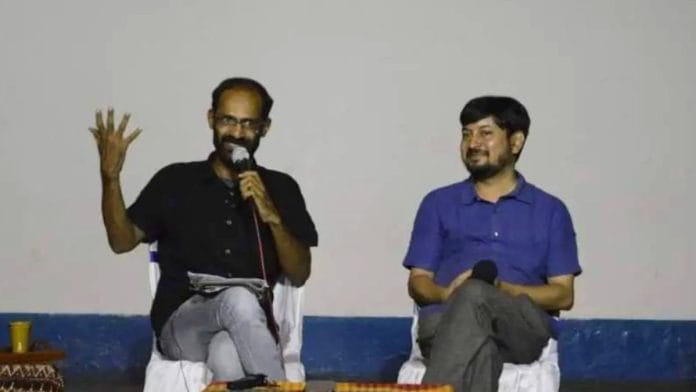Kolkata: Four months after he was released on bail, journalist Siddique Kappan who spent 851 days in prison still feels like he is in chains.
As per Supreme Court orders, Kappan has to report every Monday to his local police station in Kerala where he lives with his wife and three children. And four times a month to report to a court in Lucknow.
“Kerala to Lucknow by train is three days. One day there. Three days to get back,” said Kappan on his current routine. “So, I am still in jail. In an open jail.”
The journalist who now does translation work online to make a living said his stint in jail has made him fearless. “Do you know what the extreme stage of fear is? Its fearlessness. I am fearless now. I am nirbhay,” said Kappan in Kolkata on Sunday. He was arrested in October 2020 on his way to Hathras, Uttar Pradesh, to report the alleged gangrape, murder and forcible cremation of a 19-year-old Dalit teen. He was charged with sedition and money laundering.
The talk, organised by the People’s Film Collective, a decade-old crowd-funded organisation, was his first public engagement since being released., Kappan told a packed hall that the aim of authoritarian regimes is “to create fear. If you become fearful, you are finished. I have become fearless.”
He said this loss of fear is what gets him through life now.
Also Read: How the Supreme Court UAPA verdict leaves loopholes for agencies to exploit
First-person account
The 43-year-old journalist had set out on 5 October 2020 from Delhi for Hathras after Uttar Pradesh police cremated the victim of an alleged gangrape, reportedly without her family’s consent.
“Many people, including journalists, had asked me, rapes happen everywhere. Why did you want to go from Delhi to UP [for this case]? I said this was different. The last rites in Hathras were done not by the family but by the police. What was the state’s interest in this? That was my point,” he said.
What followed has been reported extensively but this was the first time Kappan was narrating his ordeal in first person. He was made to sit on the floor for 23 hours at a police outpost at the Manda toll plaza near Mathurawhile plainclothes police sat on chairs and fired communally-tinged questions at him.
How many times have you been to Pakistan?
Do you eat beef?
Do you know Zakir Naik?
Did you study at JNU?
Did you study at Jamia?
Are you a member of the Democratic Students Union?
Are you a Maoist?
Are you a communist?
Do you have a girlfriend?
“They slapped me thrice. Till 9 am the next morning, some nine or 10 agencies kept questioning me. I was sitting on the floor—the officers on chairs. Even criminals should not be treated like this,” he said.
But this wasn’t the worst. After the questioning, he was quarantined in a tiny room at a school in Mathura with 50 others. They had no toilet or water, just a bucket in the corner of the room. He was there for 21 days.
It was only after 45 days that he was allowed to speak with his family, including his 90-year-old mother. She passed away before Kappan got bail.
Also Read: ‘Walls would suffocate me…but only made me stronger’: Kerala journalist Kappan walks out of jail
Importance of memory
Kappan claimed his arrest was not a random act but a targeted operation. “Since 2013, I have covered issues like Gauri Lankesh’s murder, the beef issue at Kerala House, the crackdown on Media One and Asianet News, the arrests of Gautam Navlakha, GL Saibaba, and Hany Babu. I interviewed Babu’s wife and Sanjiv Bhatt’s wife. The government had an eye on me. They got a chance. So, they slapped me with PMLA and UAPA,” Kappan alleged.
He said that, unlike Indira Gandhi’s Emergency which lasted for two years, this “undeclared emergency” has been in place for the last nine years.
He added that at a time like this, the media has to play a major role. Sadly, newspapers and digital portals taking on the government are few and struggling, he said.
“Mainstream media has now become side stream and does only PR work for the government. There are exceptions. But now the only hope is alternative independent media. Else we will become a Myanmar or Afghanistan,” said Kappan.
Besides a more aware citizenry and a more active media, Kappan believes there is another tool against authoritarianism. “Our memory,” he said. “Don’t forget. We must not forget.”
Kappan was accompanied by his wife Raihana on stage. “I fought for justice — not for Kappan, my husband, but Kappan, the journalist, who was innocent and was trying to do some good work. If journalists like Kappan don’t go to Hathras, then who will come to my side if something happens to my young daughter?” she said in Malayalam.
Siddique Kappan translated to a standing ovation.
The author is a senior journalist based in Kolkata. She tweets @Monideepa62.
(Edited by Theres Sudeep)






